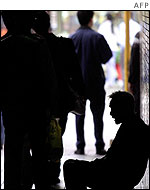BBC: HK Leader's Record Unpopularity
BBC Hong Kong correspondent
Tuesday, 27 August, 2002
In Hong Kong, public approval of the territory's Chief Executive, Tung Chee-hwa, has fallen to a record low.
It comes less than two months after Mr Tung introduced a major overhaul of Hong Kong's government, designed to make it more responsive to public opinion.
But his administration has been beset by a series of blunders and continuing economic problems.
Five years on from Hong Kong's handover to China, its people are not happy with the way their territory is being run, and they are showing it.
Bad tidings
Approval ratings for Mr Tung have slumped. More than half of people asked do not think he is doing a good job.
Just 16% think he is. The number who are dissatisfied with his performance has jumped by almost 10% since last month.
That is bad news for Mr Tung.
It was on 1 July that he made the biggest changes to the territory's government since it ceased to be a colony.
Record unemployment
Out went the civil servants who had traditionally run Hong Kong and in came a cabinet of politically-appointed ministers.
 |
| Unemployment is at an unprecedented high |
They would, Mr Tung promised, be more responsive to public opinion.
So far, at least, it does not appear to be working. The new ministers promised that creating jobs would top their priority.
But unemployment in Hong Kong has risen to an unprecedented 7.8%.
And public confidence in the new ministers slumped after an ill-judged plan to revamp the stock market was released.
The effect was to send share prices plunging, wiping millions of dollars from the value of small companies.
Losing trust
Many investors lost money, and an inquiry is considering whether the financial secretary should resign because of the fiasco.
A record 37% of people now say they do not trust their own government.
It is the first time that distrust of the government has overtaken trust in it.
[...]
http://news.bbc.co.uk/1/hi/world/asia-pacific/2218856.stm